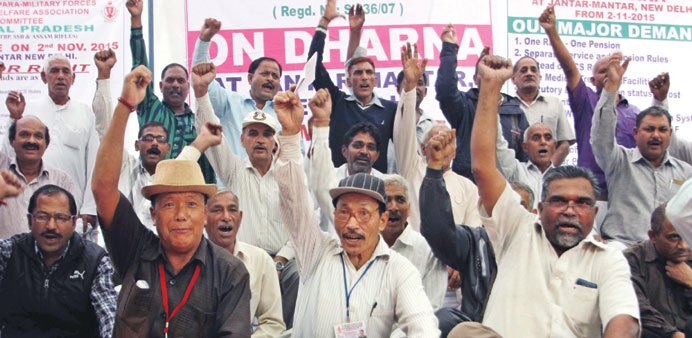IANS/New Delhi
Over 200 retired paramilitary personnel yesterday launched a three-day protest here demanding ‘One Rank One Pension’ (OROP) for around 1.3mn retired and serving personnel of the Central Armed Police Forces (CAPF).
The retired paramilitary personnel, under the banner of Delhi-based All India Central Paramilitary Forces Ex-servicemen Welfare Association, gathered at Jantar Mantar in central Delhi demanding OROP and many other rights for CAPF personnel under the central civil services rules.
A retired paramilitary officer, participating in the protest, said that the CAPF should be treated at par with the armed forces.
He said CAPF personnel were part of all the wars - 1965, 1971 and the 1999 Kargil war as they had fought along with the Indian Army and were the “first line of defence”.
He said that since independence, 22,250 army personnel lost their lives in various battles, while 33,678 CAPF personnel were killed in the line of duty.
Many other retired CAPF officials said the announcement of OROP for the army reflected the “discriminatory” attitude of the government towards them.
“We are the first line of defence in the country and guarding the national border, Maoist-affected areas, the border with Pakistan or the insurgency-hit Jammu and Kashmir and the northeastern states,” said P S Nair, general secretary of the association.
“A number of our personnel are killed in the line of duty every year. We don’t understand why the government is ignoring us in providing central facilities like other armed forces. All CAPF personnel should be provided benefits,” Nair said.
While there are over 950,000 serving personnel in forces like the Central Reserve Police Force (CRPF), Border Security Force (BSF), Indo-Tibetan Border Police (ITBP), Sashastra Seema Bal (SSB) and Central Industrial Security Force (CISF), which comprise the CAPF, there are over 350,000 retired personnel.
Nair said that if OROP is sanctioned to the CAPF, it would cost around Rs20bn to the government exchequer.
“Take the case of the Line of Control (LoC), where the BSF is deployed along with the Indian Army. If personnel from both the forces are killed in any operation, the family of army personnel get four times more pension than those of the BSF jawan. Is it not a kind of discrimination?” asked Nair.
He said that since 2004, they were clubbed with other government officials and that they stopped getting pension.
“After the Sixth Pay Commission was announced in 2004, the pension for all government servants was made ‘contributory’ in nature, with 10% of the salary being contributed by the employee and the government each,” Nair said.

Former paramilitary personnel stage a demonstration demanding ‘one rank one pension’ at Jantar Mantar in New Delhi yesterday.
